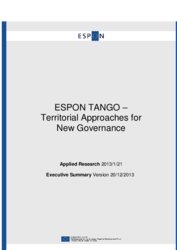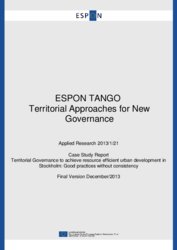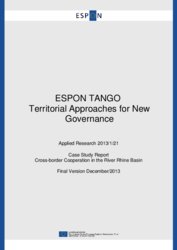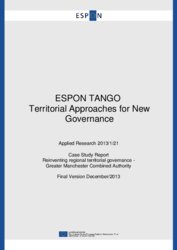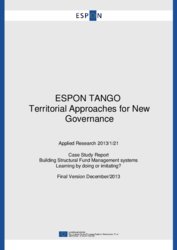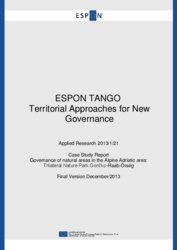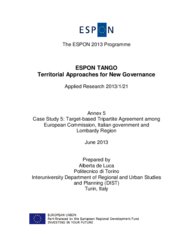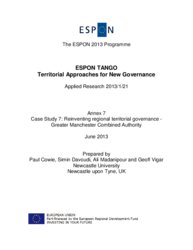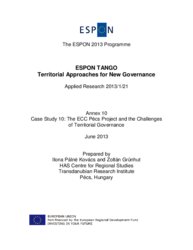TANGO - Territorial Approaches for New Governance
Theme
Territorial Governance
Thematic scope
Policymakers in the field of territorial development and cohesion recognise a clear need for coherent public action and allocation of public resources within the different territories across the European continent. Especially in times of restricted public budgets they feel a strong need to understand how policy action can become more effective in their daily practice and how synergies can be exploited through vertical and horizontal co-ordination of public policies, programmes and projects. In particular in complex policymaking contexts such as territorial development where different levels and sectors of policymaking are involved, practical advice and good examples providing inspiration for both policymakers and practitioners are needed. The aim of this project is to develop practical advice for territorial governance based on evidence from current practices.
Please read more about the main policy questions being answered and the main results envisaged, including a practical Handbook of Territorial Governance, on the next page.
Lead Partner
Nordregio, Stockholm, Sweden
Detailed information on the contracted project team can be found under Transnational Project Groups.
Sounding Board
Christabel Myers, UK
Nico Groenendijk, Netherlands
Budget: €749,849
Project’s lifetime: June 2011 to May 2014
Delivery of Reports
Inception Report: 2nd January 2012
Interim Report: 30th June 2012
Draft Final Report and Draft Handbook: 30th June 2013
Final Report and Final Handbook: 20th December 2013
Publishing
Reports will be published once they are approved by the ESPON Monitoring Committee
More information
Please contact the Project Expert at the ESPON Coordination Unit:
Michaela GENSHEIMER, e-mail: michaela.gensheimer@espon.eu
Main policy questions being answered
- How is multi-level and cross-sector territorial governance organised throughout Europe and what are good mechanisms to ensure coordination between different public sectoral policies and cooperation between different levels of public government (including neighbouring areas)?
- What role can instruments of national and regional spatial planning systems play in creating better territorial governance? And what other effective models exist to obtain this aim? What happens if such instruments and models are not present?
- What are the main lessons for future Cohesion Policy, i.e. how can Cohesion Policy encourage stronger and more efficient forms of territorial governance at the different scales?
Main results envisaged
- Evidence on recent trends in organising and managing territorial development (for instance decentralisation, fusion of municipalities, etc.).
- Insight in current good practices for territorial governance in Europe and their reason of success in achieving territorial development objectives.
- Examples of good territorial governance from a multi-level, a multi-sector and a multi-actor approach promoting territorial development and/or implementing Cohesion Policy and their main factors of success.
- Insight on barriers to territorial governance and ways overcoming of these barriers
- The possible supporting role of spatial planning instruments and other instruments in good territorial governance.
- A typology of current territorial governance practices in Europe.
- A handbook with best practices for territorial governance building on between 8 and 12 indepth case studies undertaken.
